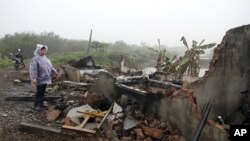When a fish farmer in north Vietnam decided to take up arms against a battalion of police sent to evict him from his land, he sparked a public debate on an issue that has long simmered beneath the surface of Vietnamese society.
Doan Van Vuon
Last month the family of Doan Van Vuon, 49, used guns and homemade landmines to attack officials trying to take their farm. Four policemen and two soldiers were injured, including the local police chief. The incident drew national headlines and a tide of public sympathy for the farmer’s stand.
Retired American diplomat David Brown, says the case mainly highlights the importance of farmers’ rights in the largely agrarian country.
“Two things stood out here," he said. "One was the incredible stupidity of the local authorities and the other is the sense that there is something sacred between the farmer and his land.”
Brown, who recently wrote a series of pieces on land reform for the magazine Asia Sentinel, says while many Vietnamese have moved to the city, most still have family in the countryside. He says the connection between the farmer and his land remains a vital part of national identity.
Land laws
In Vietnam, people can lease land but the state retains control over it. Many farmers have 20-year leases handed out by the government in 1993. Although the state can take the land back, many have faith that they will receive proper compensation for any developments made to the area.
Vuon has been hailed as a model farmer because he transformed barren land into a thriving fish farm, prompting other farmers in the area to follow his lead and make a profit. But a dispute with district authorities left him facing eviction with no compensation at all.
Corruption
Le Hien Duc, one of the country’s most prominent anti-corruption activists, says Vuon’s case exemplifies the problems faced by many farmers.
Duc says Vuon spent many years working on his land. He had to work hard and even lost his daughter on that land. She says if authorities took his land for a public school or a hospital, that would be another story, but they seized his land without a clear purpose.
Lawyer Nguyen Hong Bach, who agreed to defend Vuon’s wife and brother-in-law free of charge, says a lot of details of the incident have been covered extensively by the local media.That is how people have learned about the case. They have become very unhappy with authorities and sympathize with Vuon’s family.
Support
In a rare showing of unity, newspapers, bloggers and many high level members of government have agreed that Vuon had been treated unfairly and something should be done about it.
Last week, Prime Minister Nguyen Tan Dung announced that that an investigation into the eviction has determined it was illegal. He called for local officials involved in the case to be punished and asked the court to be lenient when dealing with Vuon’s case.
Also, crucially, he called for a review of land management policies nationwide to prevent similar cases from happening again.
David Brown commended the prime minister’s response, saying it demonstrated the government responding to public opinion.
“He did what he needed to do, one was to drop a broad hint to the courts, one that Vuon should get his fingers rapped for using improvised ordinance devices and he made it clear that not only did he expect better performance from the Hai Phong city government, but that the government understood that it needed to do a serious job of fixing the land law," said Brown. "Now I don’t know whether they can fix it or not but that was what people wanted to hear."
Legislation reviews
Legal analysts say the public debate over the Vuon fish farm will influence two key laws that are up for review next year
“The revision of the constitution in terms of land ownership is important and it’s happening already," said Jairo Acuna-Alfaro, a policy advisor for the United Nations Development Program. "Also the land law has to be amended in 2013 so in 2012 you are going to have these two separate discussions.”
Acuna-Alfaro says watching how authorities handle these reviews will be a critical test for the government that could have much wider implications in a country that has struggled to overcome entrenched graft.
“Perhaps it presents the authorities with the opportunity to set up the measures that are required to address the systemic problems of corruption in the country,” added Acuna-Alfaro.
Trial
As Vuon and three other members of his family await trial charged with attempted murder, many commentators are keeping a close eye on whether the prime minister’s words will be translated into action. It is not just Vuon’s future that is at stake, they say, but also the future of the country’s Communist Party in an era when the methods of the past are becoming less effective against the problems of the present.












